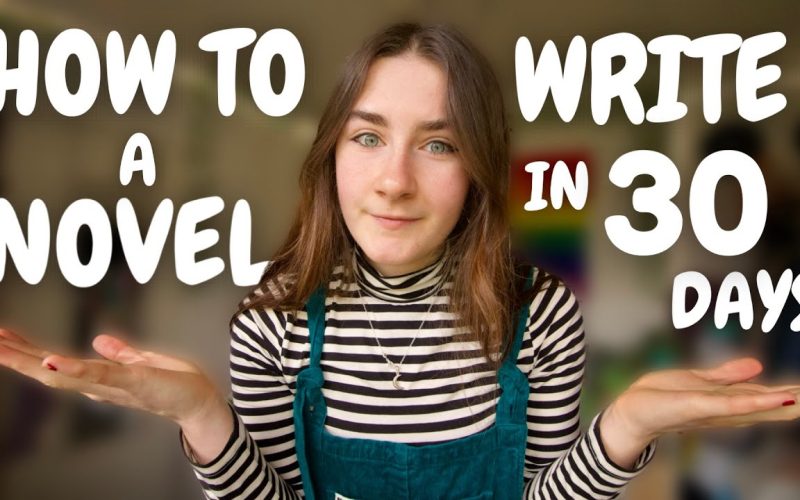Introduction
Writing a novel might seem like an overwhelming task, but what if you could complete a first draft in just 30 days? That’s the challenge many writers take on during National Novel Writing Month (NaNoWriMo) every November, but you don’t need to wait for a specific month to start your writing journey. With the right mindset, preparation, and strategy, you can turn your ideas into a full-fledged novel in just one month. Whether you’re a seasoned writer or a first-time novelist, this guide will walk you through the essential steps to stay motivated, organized, and creative. Ready to bring your story to life in 30 days? Let’s dive in.
Steps How to Write a Novel in 30 Days

1. Set Realistic Goals
The standard NaNoWriMo goal is 50,000 words in 30 days, which breaks down to about 1,667 words per day. Setting daily word count goals helps keep you on track and prevents last-minute panic.
Tip: Adjust your daily goals based on your schedule write more on weekends if weekdays are busy.
Example: “I aimed for 2,000 words on weekends to give myself breathing room during the week.”
2. Outline Your Story
Before you start writing, create a basic outline of your plot, characters, and key scenes. Even a simple roadmap can guide you through the writing process and prevent writer’s block.
Tip: Use the three-act structure to organize your story: setup, confrontation, and resolution.
Example: “I outlined major plot points for each act, which helped me stay focused and avoid getting stuck.”
3. Create a Writing Routine
Consistency is key when writing a novel in a short time frame. Establish a daily writing routine that fits your lifestyle, whether it’s early mornings, lunch breaks, or late nights.
Tip: Set a dedicated time and place for writing to minimize distractions.
Example: “I wrote every morning before work, treating it like an unmissable appointment.”
4. Silence Your Inner Critic
The goal of writing a novel in 30 days is to get your ideas on paper, not to produce a perfect manuscript. Allow yourself to write freely without overthinking or editing as you go.
Tip: Use placeholders for names or scenes you’re unsure about and revisit them later.
Example: “Whenever I hit a tricky scene, I wrote ‘FIX LATER’ and kept moving forward.”
5. Stay Accountable
Accountability can be a powerful motivator. Share your goals with friends, join online writing communities, or participate in local writing groups.
Tip: Track your progress using writing apps or a simple word count chart.
Example: “I joined a NaNoWriMo online group where we shared daily updates and encouraged each other.”
6. Embrace Writer’s Block Strategies
Writer’s block is inevitable, but it doesn’t have to derail your progress. Have strategies ready to reignite your creativity when you hit a roadblock.
Tip: Take short breaks, switch writing locations, or try writing prompts to get unstuck.
Example: “When I felt stuck, I took a walk or wrote a scene out of order to keep the momentum going.”
7. Reward Yourself Along the Way
Celebrate milestones to stay motivated throughout the month. Whether it’s hitting a word count goal or finishing a difficult chapter, rewards keep the process enjoyable.
Tip: Set small rewards for daily goals and bigger ones for major milestones.
Example: “I treated myself to my favorite dessert every time I hit a 10,000-word milestone.”
The Power of Setting a Deadline
Setting a deadline is one of the key parts of writing a novel in 30 days. When you give yourself a clear goal, it helps keep you focused. Without a deadline, it can be easy to get distracted or put off writing. A 30-day challenge gives you a clear timeframe, which can push you to stay on track and finish what you started.
The Importance of Daily Writing

Writing every day is a big part of finishing your novel in a month. Even if you can only write a little bit each day, the habit of writing daily will add up. It helps keep the story fresh in your mind, so you don’t forget where you left off. Daily writing also builds momentum, making it easier to keep going.
Staying Creative Under Pressure
Writing quickly can actually help you be more creative. When you focus on getting words on the page rather than making them perfect, your mind starts to flow with new ideas. Sometimes, limiting the time you spend on each scene or chapter can push you to think outside the box. It can spark new ideas and help you move forward in the story.
The Role of Support Groups
Having support from other writers can make a big difference. Groups like NaNoWriMo bring writers together, allowing them to share their progress and encourage each other. Being part of a writing community helps you stay motivated and feel less alone in the process. It’s a great way to stay accountable and get advice from others who are going through the same challenges.
Editing After the 30 Days
Once you’ve completed your novel in 30 days, editing comes next. The first draft is just the beginning, and it’s normal for it to be rough. After you finish, take a break and come back with fresh eyes. You can make the necessary changes, improve the story, and fix mistakes. Editing will help turn your rough draft into a polished novel.
The Sense of Accomplishment

Finishing a novel in 30 days gives you a huge sense of accomplishment. Even if your first draft isn’t perfect, you can be proud of the work you’ve done. It proves that you can stick with something and finish it. Completing a novel in such a short time also gives you confidence in your writing abilities, motivating you to keep writing in the future.
Breaking the Novel Into Small Tasks
Instead of thinking about writing an entire novel, try breaking it down into smaller tasks. You can focus on writing one chapter at a time or even one scene at a time. This makes the process feel less overwhelming and allows you to celebrate small victories. Each time you finish a task, you’re one step closer to finishing the whole novel.
Managing Your Time Wisely
Writing a novel in 30 days requires good time management. You might need to cut back on other activities to make time for writing. It’s important to balance writing with other parts of your life, so it doesn’t become too stressful. Even if it’s just a few hundred words a day, managing your time wisely will help you meet your word count goal without burning out.
Staying Positive During Hard Days
There will be days when writing feels hard. You might feel stuck or tired, and that’s okay. On tough days, try not to get discouraged. Just focus on writing a little bit, even if it’s not perfect. Remember that the goal is progress, not perfection. Each word you write brings you closer to finishing your novel.
Finding Your Writing Space

A comfortable and quiet space to write can help you focus. Whether it’s a cozy corner in your home, a café, or a library, finding the right environment is key. A good writing space should be free from distractions, where you can sit down and get into the flow of writing. This will make it easier to focus on your goal and get the words down.
Getting Past Writer’s Block
Writer’s block is something every writer faces at some point. If you get stuck, don’t worry! Take a break, do something else for a while, or write about something different. Sometimes, just stepping away from your novel for a short time can help you find new ideas. Keep writing, even if it feels slow—getting past the block is part of the process.
Learning From the Experience
Writing a novel in 30 days is not just about finishing a book. It’s also about learning from the experience. You will learn more about your writing style, what works for you, and where you can improve. The more you write, the better you become. Even if you don’t finish the novel in 30 days, the practice will help you become a stronger writer.
Challenges of Writing a Novel in 30 Days
One big challenge is the pressure of writing so quickly. It can be hard to keep up with the word count every day. Sometimes, life gets in the way, making it harder to find time to write. Also, writing fast means you don’t have much time to think deeply about your story or make it perfect. But these challenges can be managed with the right mindset.
The Future of Writing a Novel in 30 Days
In the future, more people may embrace writing a novel in 30 days as a way to stay creative. With more tools and writing groups available, writers will have even more support. This method could continue to grow as more people realize the value of getting their stories out quickly and making writing a habit.
Comparative Table: Writing a Novel in 30 Days vs. Traditional Writing Methods
| Feature | Writing a Novel in 30 Days | Traditional Writing Methods |
|---|---|---|
| Time Commitment | 30 days (1,667 words per day) | Longer, usually months/years |
| Focus | Quantity over quality | Focus on quality and detail |
| Editing | Editing after finishing | Editing during writing |
| Support | Writing groups, like NaNoWriMo | More solitary, can have critique groups |
| Pressure | High pressure to finish fast | Less pressure, more relaxed |
Analysis Table: Writing a Novel in 30 Days
| Factor | Writing a Novel in 30 Days | Traditional Writing Methods |
|---|---|---|
| Writing Speed | Fast and intense | Slow and steady |
| Creativity | Encourages quick ideas | Allows time for deeper thinking |
| Stress Level | High, due to deadlines | Low, relaxed pace |
| Risk of Burnout | Possible without breaks | Less likely, more spread out |
| End Result | Rough draft, needs editing | More polished, but incomplete |
Conclusion
Writing a novel in 30 days is an ambitious challenge, but with the right mindset and strategies, it’s entirely achievable. By setting realistic goals, creating a solid outline, and staying consistent with your writing routine, you’ll make steady progress toward completing your first draft. Remember, the goal isn’t perfection—it’s about getting your story on paper. You can always revise and polish later. Embrace the process, stay motivated, and don’t be afraid to push past your comfort zone. At the end of 30 days, you’ll have something amazing: a novel that’s uniquely yours.
Call to Action
Have you ever tried writing a novel in 30 days? Share your tips and experiences in the comments below, and subscribe for more writing advice and inspiration!










